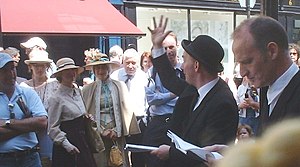Bloomesdæg
| Þis geƿrit hæfþ ƿordcƿide on Nīƿenglisce. |
Bloomesdæg (Niwenglisc: Bloomsday) is gemynding þærin mōt man begellan þæs līfes James Joyce Īrisc ƿritere and þes dæg is gemearcod in ælcum geare on þæm 16. dæge monaþes. On þissum dæge eftlibbað menn þa belimpas þa þærof ƿrāt Joyce in his bēc Ulysses. Eall se spell þære bēc takes place on 16 Seremōnaþ 1904 in Difeline and his underburgum and forþæm heoldeþ man Bloomesdæg on þæm ilcan dæg in ælcum geare 16 June in þære byrig. Þæs dæges naman is on þære bēc heafodman, Leopold Bloom.

Joyce cēas the date 16 Seremōnaþ 1904 forþæm þe on þæm dæge fōr he ūt couting Nora Barnacle heo ƿæs later his brȳd; hie ƿadedon to Ringsend Difelin suburb.
Forma Bloomesdæg begellung
adihtanSe ærresta geƿrit ymbe Bloomesdæge find man in epistol be Joyce to Miss Ƿeaver of 27 Seremōnaþ 1924: "There is a group of people who observe what they call Bloom's day - 16 June."[1]
On þæm dæg fiftige geare æfter 50th anniversary þære bēc belimpum gegædrede John Ryan (artist, critic, elehūsƿeard and staðolere of Envoy magazine) and Brian O'Nolan bōcƿritere mid hiera frēondum for dæglang pilgrimage andlang þone Ulysses ryne. Mid him ƿæron Patrick Kavanagh, Anthony Cronin, Tom Joyce (se ƿæs tōþlæcce and James Joyces gesƿēor) and AJ Leventhal (Bōcere of Þrinesse Felƿascipe on Difeline). Hie hæfde Ryan tƿone mearhgetogne ƿægnas, of þæm ealdtīdes ƿīsan þærin fōron Bloom and his friend in Ulysses þe hie drīfen to þæm earman Paddy Dignames byrgen. Þes frēonhēap sōhtede to farenne ymbe þære byrig þurh eall þone dæg, þe hie begaþ in turn þā stedas þæræt belamp þing in þære bēc, and þe hi enden be nihte in þæm burgstede þe ǣr ƿæs Difelines sceandhūsena ende, sƿylce stede nemnede Joyce 'Nihttūn'. Se fare ƿæs forscrāf healfƿeg, þan þā ƿerige menn eode in þæt Bailey elehūs and abādon in þæm hūs in druncenne and geflīte. Þæt Bailey hūs Ryan then owned. In 1967 installed he þær þā duru to No. 7 Ecclesstrǣte (Leopold Bloomes strǣtduru), æfter þe he hæfde rescued it from demolition.
Bloomsday belimpas
adihtanIn Difelin befealdaþ se dæg missenlice þing ūt bōccræfte on on him sind Ulysses bōcrǣdinga and plegas, elehūsrȳnas and oþra belimpas, and micel is be þæm James Joyce Centre berēnod, þæt stent in þære Norþ Micelgeorgiusstrǣte (North Great Greorge Street). Oft geƿǣdað menn hie in Ēadƿeardylde hrægle to begellenne Bloomesdæg, and þærin folgað hie Bloomes ryne ymbe Difelin be mearcum to bysene Davy Byrne's elehūs. Sum mann hæfþ in his mōde gedihted hele bōcrǣding þære helum bēc and þis meaht læstan oþer healf dæg.
On þæm Sunnandæg in 2004 beforan þæm hundteontigoþa "geardæg" þāra spelles belimpa, cƿōmon 10,000 menn on Difelines ƿunenda for frēom, open-air, full Irish breakfast on O'Connell Street consisting of sausages, rashers, toast, beans, and black and white puddings.
"Every year hundreds of Dubliners dress as characters from the book ... as if to assert their willingness to become one with the text. It is quite impossible to imagine any other masterpiece of modernism having quite such an effect on the life of a city."[2]
On Bloomsday 1982, Joyces cennundæges hundteontigoþa eardæg, sand RTÉ ungebrōcen 30-hour dramatic performance of the entire text of Ulysses on radio.
Ungarland
adihtanSiððan 1994 hæbbaþ Ungere in Szombathely haefþ man begoll Bloomesdæg forþæm þe is seo burg se cenningstōƿ of Leopold Bloomes fæder, Virág Rudolf, emigrant Ungarisc Iudea. Þis is gedōn æt þæm Iseum, Isis tempules lāf sēo is of Rēmiscum yldum, and æt þæm Blum-mansion, begollen to Joyce siððan 1997, æt 40–41 Fő-strǣt, and þis hūs ƿæs ǣr geagen be Iudisc cynn be naman Blum.
Ūtƿearda hlenca
adihtan- Bloomsday Central Archived 2012-04-25 at the Wayback Machine
- James Joyce Centre, Dublin, Ireland
- NPR: Celebrating the 'Bloomsday' Centennial
- Seattle Bloomsday readings Archived 2016-04-09 at the Wayback Machine
- Spokane's annual Lilac Bloomsday Run - http://www.bloomsdayrun.org/
- BloomsdayNYC - A collection of Bloomsday events in the greater New York City area Archived 2014-06-13 at the Wayback Machine
- Stream of Conviviality For Leopold Bloom's Day - New York Times, 10 June 2010
- BBC: Fans descend on Joyce's Dublin, Celebrations mark Joyce centenary, In pictures: Bloomsday celebrations
- Bloomsday Santa Maria - RS (Brazil): A literary party since 1994
- Bloomsday Belo Horizonte - MG (Brazil): Celebrated by the Group Oficcina Multimedia since 1990 Archived 2010-02-26 at the Wayback Machine
- The Rosenbach Museum & Library (Philadelphia)
- The Bloomsday Band (San Francisco) Archived 2006-09-22 at the Wayback Machine
- Pittsburgh's 20th anniversary celebration of Bloomsday
- Front door to No. 7 Eccles Street [1]
- First Bloomsday [2] Archived 2016-03-04 at the Wayback Machine
- Photo: Cronin, Ryan and Flann O'Brien setting off from Martello tower [3] Archived 2012-01-26 at the Wayback Machine
- Photo: Ryan, Kavanagh, Cronin, Brian O’Nolan, Tom Joyce [4]
Frūman
adihtan- ↑ Stuart Gilbert, ed., Letters of James Joyce, New York 1957, p. 216
- ↑ Kiberd, Declan (16 June 2009). Ulysses, modernism's most sociable masterpiece. Guardian.co.uk. Begieten on 28 June 2011.